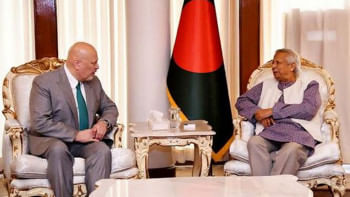Savers squeezed by low interest rates

Savers are now counting negative returns on their money once inflation and tax are taken into account.
Even the declining inflation rate could not protect the depositors from seeing their savings get squeezed or become negative in real terms.
Most of the banks now offer 5-5.75 percent interest against fixed deposits of one-year tenure.
In other words, if a depositor keeps Tk 100,000 at a bank for one year, he will get a maximum of Tk 5,750 as interest earnings on the deposit.
And after deducting tax at 15 percent, the amount comes down to Tk 4,887.5, meaning the net interest income stands at only 4.88 percent.
If the depositor is a taxpayer with an electronic tax identification number, he will pay 10 percent tax and his net interest income will be Tk 5,175 or 5.17 percent a year.
The rule of thumb is that after tax, the rate of interest earned on savings must be greater than the rate of inflation in order for the money to actually be growing.
And in both the cases here, the depositors' returns are lower than the inflation rate, meaning their money has lost value in real terms.
The latest government figure shows the monthly inflation rate went down to 5.45 percent in May. It means a product or service that cost Tk 100 in May last year now costs Tk 105.45.
Besides, the average inflation rate in the past one year -- from May 2015 to May 2016 -- was 5.97 percent.
The situation has hit the common people hard as on the one hand their cost of living is increasing and on the other hand their savings are worth less now.
Bankers blamed the squeezing return on deposits on the low demand for loans that has ultimately been fuelling the banks' excess liquidity.
They also said banks cannot raise rates to counter inflation-related loss to the customers.
While they are concerned about the situation, they cannot raise the deposit rates unless there is a pickup in credit off-take. Otherwise, the banks' profitability would be under further pressure.
“All banks have surplus liquidity, but the demand for credit is not picking up to expectations,” said Ahmed Kamal Khan Chowdhury, managing director of Prime Bank.He said foreign funds borrowed by entrepreneurs are also limiting their loan disbursements. “Even the government is taking loans from foreign sources to implement mega projects,” he added.
Anis A Khan, managing director of Mutual Trust Bank, analysed the issue comprehensively and found a number of reasons behind the declining interest rates on fixed deposits.
Due to strong anti-money laundering measures and improvements in remittance channels, more money is now being deposited with the banks.
Financial inclusion has also contributed to wider outreach of the banking system, thereby embracing larger swathes of unbanked population.
In other words, money that was previously kept at peoples' homes is now finding its way into the banking system.
Thus, there is more money available in the banking system compared to a few years ago, said Khan, also the chairman of Association of Bankers Bangladesh, a forum of banks' chief executives.
“However, this excess supply is not matched with the demand, which is credit off-take,” he said, adding that the government is also borrowing less from the banking system, which is leading to excess liquidity.
The capital markets too are under-performing, so savers are keeping themselves away from a market that earlier gave them good returns. “Thus, the small savers, especially the elderly who depended on bank interest for their living expenses, have been hit hard,” Khan added.
Shafiqul Alam, managing director of Jamuna Bank, said like other banks his bank is also offering 5.5 percent interest on half-yearly or yearly fixed deposits due to low demand for loans.
He said the overall situation has forced banks to reduce lending rates to single digits for short-term loans to their prime customers. However, chief economist of Bangladesh Bank Biru Paksha Paul termed the declining deposit rate a temporary phenomenon.
“When investments will get a boost, the demand for deposits and its interest rate will also rise,” Paul said.
He, however, said general people are not well aware about the interest rates on their deposits. He also said earnings from deposits get negative in many countries, including the United States.
Amid this situation, some banks are offering 7 percent plus interest on deposits of more than one year but less than two years. “We are trying to give pensioners and small depositors some more money so that they don't get less than the inflation rate,” said Habibur Rahman, managing director of Al-Arafah Islami Bank.


 For all latest news, follow The Daily Star's Google News channel.
For all latest news, follow The Daily Star's Google News channel. 



Comments